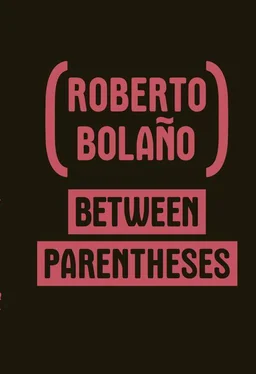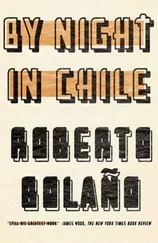Roberto Bolaño - Between Parentheses - Essays, Articles and Speeches, 1998-2003
Здесь есть возможность читать онлайн «Roberto Bolaño - Between Parentheses - Essays, Articles and Speeches, 1998-2003» весь текст электронной книги совершенно бесплатно (целиком полную версию без сокращений). В некоторых случаях можно слушать аудио, скачать через торрент в формате fb2 и присутствует краткое содержание. Год выпуска: 2011, Издательство: New Directions, Жанр: Публицистика, Критика, на английском языке. Описание произведения, (предисловие) а так же отзывы посетителей доступны на портале библиотеки ЛибКат.
- Название:Between Parentheses: Essays, Articles and Speeches, 1998-2003
- Автор:
- Издательство:New Directions
- Жанр:
- Год:2011
- ISBN:нет данных
- Рейтинг книги:4 / 5. Голосов: 1
-
Избранное:Добавить в избранное
- Отзывы:
-
Ваша оценка:
- 80
- 1
- 2
- 3
- 4
- 5
Between Parentheses: Essays, Articles and Speeches, 1998-2003: краткое содержание, описание и аннотация
Предлагаем к чтению аннотацию, описание, краткое содержание или предисловие (зависит от того, что написал сам автор книги «Between Parentheses: Essays, Articles and Speeches, 1998-2003»). Если вы не нашли необходимую информацию о книге — напишите в комментариях, мы постараемся отыскать её.
The Savage Detectives
Between Parenthese
Between Parentheses: Essays, Articles and Speeches, 1998-2003 — читать онлайн бесплатно полную книгу (весь текст) целиком
Ниже представлен текст книги, разбитый по страницам. Система сохранения места последней прочитанной страницы, позволяет с удобством читать онлайн бесплатно книгу «Between Parentheses: Essays, Articles and Speeches, 1998-2003», без необходимости каждый раз заново искать на чём Вы остановились. Поставьте закладку, и сможете в любой момент перейти на страницу, на которой закончили чтение.
Интервал:
Закладка:
BOLAÑO: My youth and my walks with Mario Santiago.
PLAYBOY: What Mexican writer do you deeply admire?
BOLAÑO: Of my generation I admire Sada, whose goals seem the most daring to me, Villoro, Carmen Boullosa. Among the younger writers I’m very interested in what Álvaro Enrigue and Mauricio Montiel are doing, or Volpi and Ignacio Padilla. I keep reading Sergio Pitol, who gets better every day. And Monsiváis, who, according to Villoro, gave Taibo II or III (or IV) the nickname “Pol Pit” which I think is a stroke of poetic genius. Monsiváis still keeps his talons filed. I also like what Sergio González Rodríguez is doing.
PLAYBOY: Does the world have a cure?
BOLAÑO: The world is alive and nothing alive needs a cure, which is lucky for us.
PLAYBOY: In what or in whom do you place your hopes?
BOLAÑO: My dear Maristaín, you propel me again into the realm of sappiness, which is my natural abode. I have hope in children. In children and warriors. In children who fuck like children and warriors who fight like brave men. Why? I refer you to the gravestone of Borges, as the illustrious Gervasio Montenegro, of the Academy, would say. And that’s enough of that.
PLAYBOY: What does the word posthumous remind you of?
BOLAÑO: It sounds like the name of a Roman gladiator. An undefeated gladiator. Or at least that’s what poor Posthumous imagines in order to give himself courage.
PLAYBOY: What do you think about the people who say that you’ll win the Nobel Prize?
BOLAÑO: I’m sure I won’t, just as I’m sure that some slacker from my generation will, and he won’t even give me a nod in his speech in Stockholm.
PLAYBOY: What would you have liked to be instead of a writer?
BOLAÑO: I would much rather have been a homicide detective than a writer. That’s one thing I’m absolutely sure of. A homicide cop, someone who returns alone at night to the scene of the crime and isn’t afraid of ghosts. Maybe then I really would have gone crazy, but when you’re a policeman, you solve that by shooting yourself in the mouth.
PLAYBOY: Do you confess to having lived?
BOLAÑO: I’m still alive, I’m still reading, I’m still writing and watching movies, and as Arturo Prat said to the sailors of the Esmeralda before their last stand, so long as I live, this flag will fly.
Sources
The references that follow don’t pretend to be exhaustive. As is not uncommon, Bolaño occasionally submitted for publication pieces that had previously appeared elsewhere, especially if in a different country. To follow the trail of each and every one of the pieces gathered here through the many Spanish and Latin American newspapers and magazines to which Bolaño contributed is a task that lies outside the scope of this volume. In fact, the volume was assembled in the knowledge that some pieces that had been overlooked would inevitably turn up here and there after it was published. At least there won’t be many of them, since access was had to the computer files where Bolaño himself kept most, if not all, of his contributions — in considerable disarray, it must be said. Which means that it’s impossible to be sure whether a few of the pieces included here were ever previously published. When it’s known that a certain piece was published in more than one place, the different sources are given. In just a few cases, and in fairly arbitrary fashion, some explanatory notes are included when judged to be of interest to the reader.
PREFACE
Self-Portrait. Brief autobiographical statement written at the request of the Rómulo Gallegos Center for Latin American Studies when, in 1999, Bolaño won the prize awarded by the Center.
THREE INSUFFERABLE SPEECHES
The Vagaries of the Literature of Doom. Read December 14, 2002 at the Kosmópolis International Festival of Literature hosted by the Centre de Cultura Contemporànea (CCCB) in Barcelona. Bolaño introduced the reading of the text with the following remarks (which are transcribed from a tape recording): “This piece is very limited in scope and hasn’t been revised, which means that everything said in it is subject to subsequent rectification. Originally I wanted to discuss the literature of the Southern Cone of America, or Chile, Argentina, and Uruguay, but Argentine literature is so rich, so powerful, that in the end it seemed more fitting to focus exclusively on it; on Argentine fiction, basically. My initial idea was to talk about Argentine literature from Borges to Rodrigo Fresán, but I soon realized that in order to do that I would’ve needed one hundred pages, not ten, and I was no more prepared to write one hundred pages than you would’ve been to listen to them. The piece is therefore limited to the drift of Argentine literature since Borges’s death; to its gangster drift since Borges’s death, basically. Sadly, this gangster literature, or literature of doom is the most vital, the richest. Personally, it doesn’t excite me much, mostly because I’m sick of the literature of doom, but there’s no doubt that it’s the most vital, and that it has the most influence on the rest of Latin American literature. The literature of doom, as I’ve said, is a kind of sub-world or infra-world outside the law.” For his reading, Bolaño numbered the paragraphs of the text.
Caracas Address . Read August 2, 1999 at the award ceremony for the Rómulo Gallegos Prize, in Caracas. Published in Diagonal (cultural supplement of the newspaper El Metropolitano , Santiago de Chile), September 5, 1999 (under the title “Corriendo la línea” [Running the Line]). Also published in the Spanish edition of the magazine Letras Libres , Number 10, October 1999, and in the magazine Lateral (Barcelona), Number 59, November 1999, pp. 40–41. Collected by Celina Manzoni in Roberto Bolaño: La escritura como tauromaquia [Writing as Tauromachy], Buenos Aires, Corregidor, 2002, pp. 207–214.
Literature and Exile . Read April 3, 2000 as part of “Europe and Latin America: Literature, Immigration, and Identity,” a symposium organized by the Austrian Society for the Literature of Vienna. Published in sábado (cultural supplement of the newspaper unomásuno , Mexico), October 7, 2000; also published in the magazine Turia (Teruel), number 54, November 2000, pp. 41–46.
FRAGMENTS OF A RETURN TO THE NATIVE LAND
Exiles. Possibly unpublished text, in any case written before Bolaño’s first trip to Chile, in November 1998. It’s likely that Bolaño wrote it for the lecture series “Literature and its Limits,” organized by Jesús Ferrero as part of the Navarra Festivals, 1997. Bolaño gave his talk on August 13.
Fragments of a Return to the Native Land. Published in the magazine Paula (Santiago de Chile), Number 792, February 1999, pp. 98–101. The piece was preceded by the following editor’s note: “Last November, when the writer Roberto Bolaño was in Chile as a juror for Paula ’s story competition, we asked him to write his impressions of the country after 25 years away. Two months later he sent us what he’d written, begging us not to cut a thing or change a single comma. We obeyed, and here’s his piece in full, exclusively for our readers.”
The Corridor with No Apparent Way Out. Ajoblanco (Barcelona), Number 116, May 1999, pp. 54–57. The piece was accompanied by the following editor’s note: “The writer Roberto Bolaño, winner of the Herralde Prize for The Savage Detectives , has returned to his native Chile after twenty-five years of exile. Three months ago he told us in these very pages that he hoped to find a ‘tolerant country,’ but that was ‘just a dream.’ This is the account of his bitter homecoming.” As noted in the Introduction, the piece soon made the rounds in Chile, arousing feelings of resentment, so that when Bolaño returned to Chile in November 1999, he was the frequent target of hostile remarks and attitudes. By then, Bolaño had won the Rómulo Gallegos Prize and his growing fame and prestige did much to heighten the suspicions and offense fostered by his often defiant declarations about the culture, politics, and society of his native country. An unpublished text discovered among Bolaño’s posthumous papers describes an incident that occurred during his first trip to Chile, in 1998: “The next year, in 1999, I traveled to Chile at the invitation of the Book Fair. Possibly to celebrate my recent receipt of the Rómulo Gallegos Prize, almost all the Chilean writers decided to attack me en patota , as they say in Chile, or en masse. I counterattacked. An older woman, who had lived all her life on the handouts that the State gives to artists, called me a lackey. I’ve never lived on the largesse of any country, so this accusation surprised me. It was also said that I was a patero , which doesn’t mean the same thing as patota . A patero doesn’t necessarily belong to a patota , as one might inadvertently assume, although in every patota there are always pateros . A patero is a flatterer, a smooth-talker, a bootlicker; an ass-kisser, in proper Spanish. The incredible thing about this is that the people who were calling me names were Chileans, left-wing as well as right-wing, who kissed ass incessantly to cling to their shreds of fame, whereas everything that I’ve achieved (which isn’t much) I’d gotten without the help of anyone. What was it they didn’t like about me? Well, someone said it was my teeth. There I have to say they were absolutely right.” This isn’t the place to explain the allusions that Bolaño makes here, though it’s worth confirming that everything he reports is true, including the remark by a distinguished Chilean writer about his teeth.
Читать дальшеИнтервал:
Закладка:
Похожие книги на «Between Parentheses: Essays, Articles and Speeches, 1998-2003»
Представляем Вашему вниманию похожие книги на «Between Parentheses: Essays, Articles and Speeches, 1998-2003» списком для выбора. Мы отобрали схожую по названию и смыслу литературу в надежде предоставить читателям больше вариантов отыскать новые, интересные, ещё непрочитанные произведения.
Обсуждение, отзывы о книге «Between Parentheses: Essays, Articles and Speeches, 1998-2003» и просто собственные мнения читателей. Оставьте ваши комментарии, напишите, что Вы думаете о произведении, его смысле или главных героях. Укажите что конкретно понравилось, а что нет, и почему Вы так считаете.












